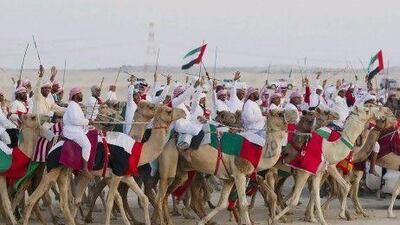"He who does not know his past," Sheikh Zayed once memorably observed, "cannot make the best of his present and future, for it is from the past that we learn."
But despite the wise words of the nation's founder, there is an overwhelming lack of knowledge of the UAE's history among Emiratis and expatriates alike.
In a survey conducted for The National and Al Aan TV by YouGov, very few people knew the answers to questions about even recent history, such as the year in which Sheikh Zayed, the founder of the UAE, died, the year oilfields were discovered and the name of the ruler of Abu Dhabi before Sheikh Shakhbut.
Nearly 70 per cent of the 141 Emiratis surveyed knew the date of the UAE's foundation, although only 56 per cent knew how many emirates it first consisted of.
And in spite of a love of Sheikh Zayed, barely half knew that the year in which he died was 2004.
Looking further back, knowledge became even sketchier.
Only 31 per cent of Emiratis knew that oil was discovered in Abu Dhabi in 1958 (even picking randomly, a quarter of respondents would be expected to pick the right answer from a choice of four).
And 36 per cent knew that the battle of Dibba took place in the 7th century.
On commercial issues and regional knowledge, respondents fared better.
Seventy per cent knew it was Japan's pearl trade that led to the decline of the industry in the UAE, and 78 per cent knew Bu Tinah was not among the islands occupied by Iran.
Participants in the survey were asked 20 questions (15 of which appear alongside).
The average score among Emiratis was 9.5 out of 20. Someone answering at random would be expected to get five right.
Arab expatriates fared worse, with an average score of 6.9 among the 340 surveyed.
While 58 per cent of Arab expats knew when the UAE was founded, only 40 per cent knew the year of Sheikh Zayed's death and the same number knew how many emirates formed the original UAE. (Westerners did worse still, but the sample was too small to be meaningful.)
The problem, according to Dr Howard Reed, the head of the Dubai Women's College, lies in a dearth of history on school curricula.
To overcome this, his college, which has only Emirati students, has formed an Arabic history and literature club.
"I get fed up with how little the students know or care about their own history," Dr Reed said. "In schools, it's about memorising, taking a test and forgetting. It's not something that becomes part of their life. They had no idea when I told them how Spain used to be run by Arabs.
"They're a little better at contemporary history but they couldn't tell you what's in the constitution."
Dr Mohammad Alzyoud, head of education at Abu Dhabi University, called for up to 20 per cent of the curriculum in both public and private schools to be dedicated to UAE history and culture.
"In other countries there is a national curriculum, so no matter what your nationality you have to study something about the country, the history, values, culture and religion and this isn't the case in the UAE.
"There are so many schools following different curriculums. It's something very critical when we talk about teaching history to locals and expats."
While he would prefer expatriates chose to learn something about the country in which they live, the emphasis should be on teaching history to the indigenous population.
"Emiratis have the same situation as expats," he said. "They know a little but it's a similar situation. Even if locals study history, they know very little about the country across the ages before recent history.
"National history would enrich the school curriculum. We give high importance to English, science, maths, but we don't give the right attention to history and the related issues."
Nor is much local history taught at universities. Only three - United Arab Emirates University, the Paris Sorbonne University Abu Dhabi and the University of Sharjah - offer any kind of UAE history course.
Dr Leo Chavez, director of Dubai Men's College, said that in the US and elsewhere there was more teaching of national history and culture than in the UAE - a "profound difference".
"I'd like to see us move in the direction of providing a greater understanding of the history, culture and language, so students can make good decisions about what they want to preserve and change."
For the answers: Click here

